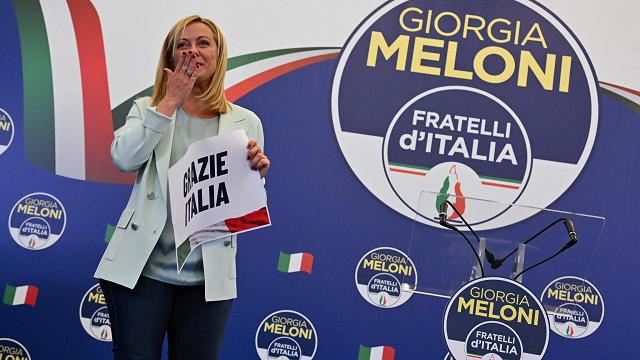
The pre-election polls were right for once. A right-wing coalition was widely predicted to win Italy’s elections on Sunday. And it did, handily. Giorgia Meloni’s party, the Brothers of Italy, carried 26% of the vote, with the other conservative parties bringing the total up to 44%, making her the undisputed leader of the conservative coalition that will have a majority in Italy’s new Parliament.
The victory has made Ms. Meloni, 45, the object of widespread international perplexity and even abuse. She has been portrayed as the heir of Benito Mussolini and the harbinger of a new fascism. Yet whatever Italian democracy’s many faults, it isn’t toppling, and there is no risk of authoritarianism. Ms. Meloni, a career politician, has been vocal in defending Parliament’s prerogatives against encroachments by the executive branch. She owes her victory at least in part to opposing the government’s management of the Covid-19 pandemic, which included draconian lockdowns—the most authoritarian policy Italians experienced in generations since World War II.
Ms. Meloni will be appointed prime minister in a few weeks. She has a long political history but little executive experience. She calls herself a conservative but in Italy, as in most European countries, intellectuals, experts and policy wonks overwhelmingly belong to the left. The new government will face some daunting challenges.
The first will be to put together a budget, which needs to be approved by the end of the year. The legislative process for constructing a budget is onerous, but in an exercise of self-restraint during the campaign, Ms. Meloni (unlike her allies Silvio Berlusconi and Matteo Salvini) was parsimonious with promises. She has criticized Italy’s budget deficit and the rapid rise of an already large public debt, which is now near 150% of gross domestic product, the second-largest by that measure in the eurozone.
Italy has been the major beneficiary of Next Generation EU funds, but the previous government, led by Mario Draghi, chose to add a further €30 billion of national debt. The spending ranged from railroad infrastructure to questionable territorial healthcare facilities. The European Union will disburse the promised money when Italy reaches certain milestones, but the new national debt has already been incurred.
In coping with the energy crisis, the Italian government has enacted discounts on electric bills, subsidies to low-income families, and a temporary reduction of gasoline taxes, for a total of €59 billion (a bit more than 3% of GDP). But in Italy, as the 20th-century journalist Giuseppe Prezzolini observed, nothing is more permanent than “temporary” measures. Ending these subsidies would be politically suicidal for the new government.
Ms. Meloni insisted recently that the sustainability of public debt depends on economic growth. Her coalition’s proposals include lower taxes on both labor and corporate profits. But these measures will be insufficient. Our think tank, Istituto Bruno Leoni, has been looking at entrepreneurial dynamism over the past century. Both in the U.S. and Italy, the net turnover of businesses is trending downward. In the U.S. (except during the financial crisis), it’s still positive: More businesses are being born than dying. But Italy has been negative since 2001, with 4% of businesses dying a year and only half as many being born.
Historians remember Italy’s economic miracle in the 1950s. In 1953 GDP per capita was 30% higher than the peak reached in the preceding 20 years, and the country had four million more people than it did in 1939. Italy industrialized rapidly, and exports grew from 8% of GDP in 1938 to 21% in 1965.
From 2010 to 2018, exports were the only positive contribution to GDP, with other components of the economy shrinking. The Italian export companies that keep the country afloat are by and large the descendants of the 1950s, the short season in Italian history in which the government unleashed private enterprise. Doing so again requires a major deregulation and a wholesale tax reform aimed at creating incentives for productivity. It’s unclear that Italy’s political class—including Ms. Meloni—understands this.
dal Wall Street Journal, 27 settembre 2022